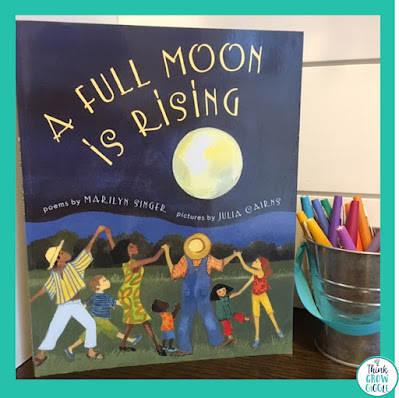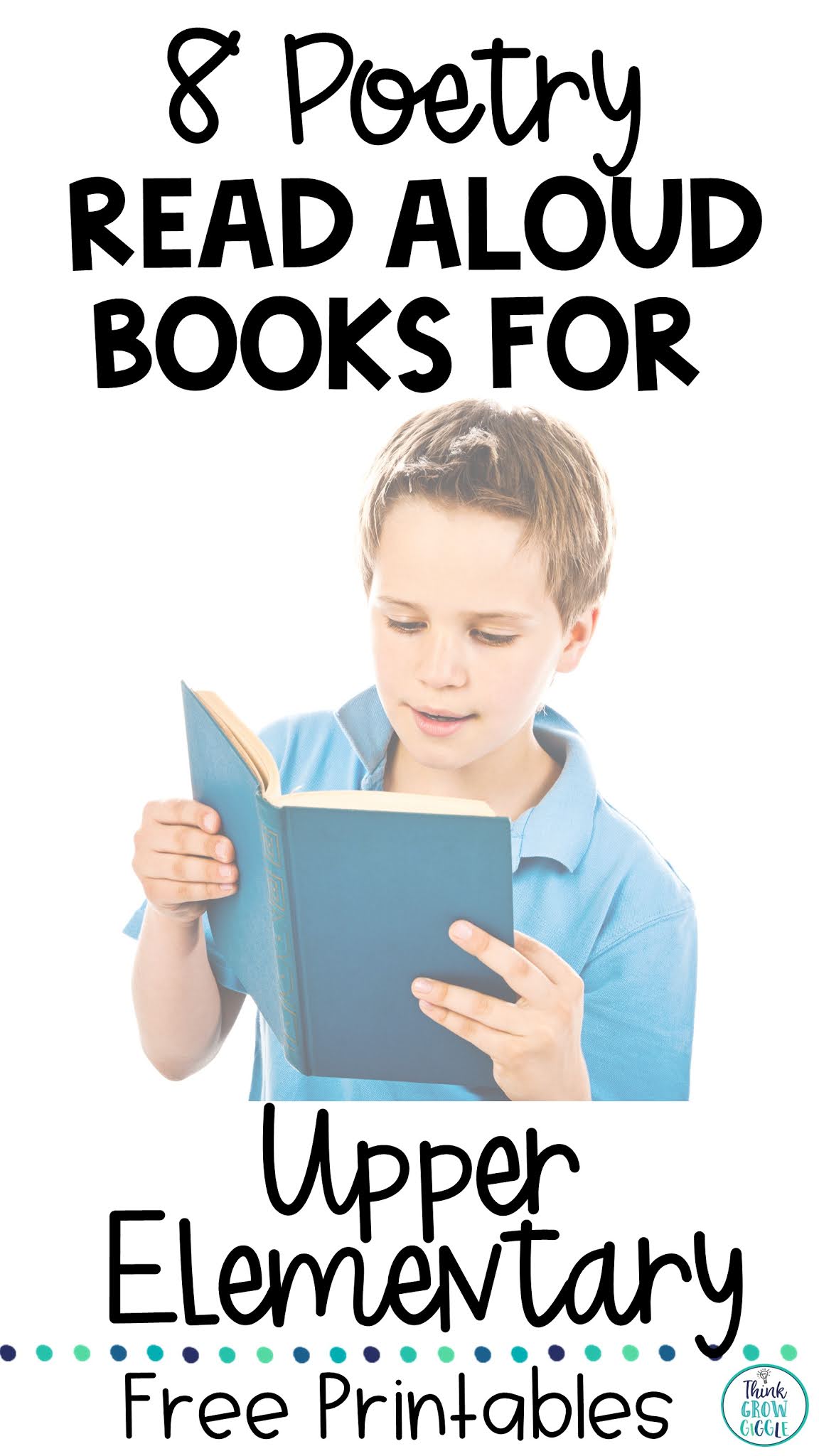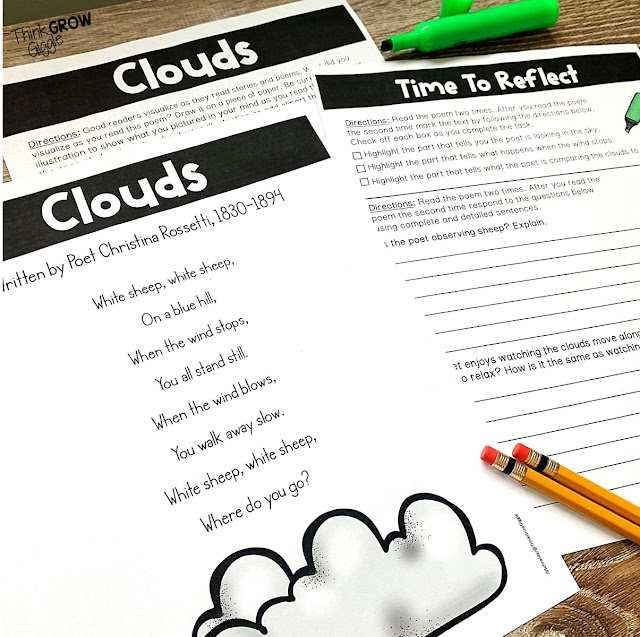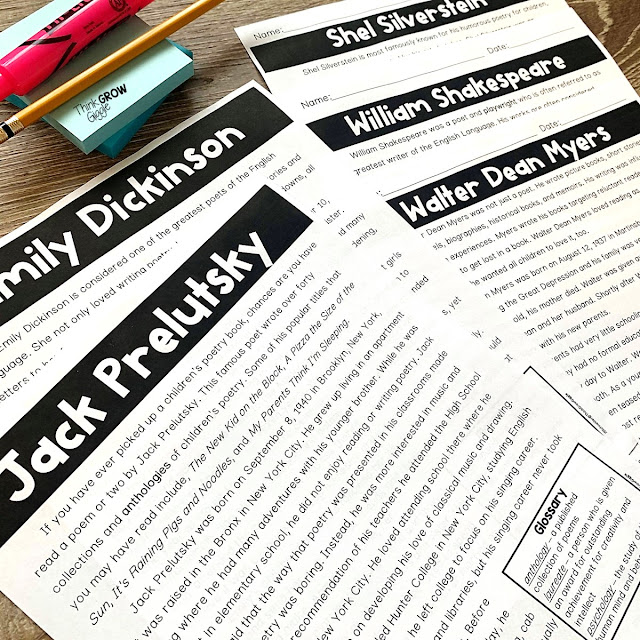Have you
ever noticed how quiet the room gets when upper elementary students are being
read to? There is something so calming and serene about sitting and listening
to a story being read aloud. Picture books, chapter books, and poetry books alike are
loved by students of all ages, including older students.
Reading aloud promotes a love of reading, models fluency, and encourages meaningful discourse about books. Poetry stimulates emotions which allow students to easily make connections and comprehend the poem that is being read. This is an especially wonderful thing for our struggling readers, as it boosts their reading comprehension confidence.
Since the curriculum is often jammed pack with fiction and nonfiction reading strategies and standards, poetry often gets left behind and forgotten. Poetry should be front and center in the classroom and woven into read-aloud schedules each month. The benefits of poetry should not be contained to just one month: National Poetry Month.
Reading aloud promotes a love of reading, models fluency, and encourages meaningful discourse about books. Poetry stimulates emotions which allow students to easily make connections and comprehend the poem that is being read. This is an especially wonderful thing for our struggling readers, as it boosts their reading comprehension confidence.
Since the curriculum is often jammed pack with fiction and nonfiction reading strategies and standards, poetry often gets left behind and forgotten. Poetry should be front and center in the classroom and woven into read-aloud schedules each month. The benefits of poetry should not be contained to just one month: National Poetry Month.
If poetry is something missing from your
classroom start with these fresh and classic poetry books and have your
students start reaping the many benefits of poetry!
This diverse
list of poetry read-aloud books are the perfect way to welcome poetry and
National Poetry Month into your upper elementary classroom while providing
content-based lessons and addressing the standards, too.
Read on to find out more about each book, and be sure to grab the coordinating FREE student activity that goes with these books at the bottom of this post.
Read on to find out more about each book, and be sure to grab the coordinating FREE student activity that goes with these books at the bottom of this post.
Dogku written by Andrew Clements
I am not
fully sure how I taught haiku writing before this picture book was published!
Dogku is written only in haikus, yet tells a full story about a stray dog’s
adoption experience. The kids are always amazed when they find out that the entire story is written using just haikus. They love to reread each page and check each haiku
for the correct use of the syllable pattern. Of course, the perfect follow-up is
to write their own haiku, but go even further and challenge students, or groups
of students to write an entire tale! Is your class more into cats than dogs? Grab this cat-focused haiku picture book: Wonton written by Lee Wardlaw, too!
Giraffes
Can’t Dance written by Giles Andreae
I love this
book, not just for its fun poetic rhyming text, but for the powerful message it
sends to its readers. (Perfect for theme lessons, too) The giraffe in this story gets teased by the other
animals because of the way he dances. As the story goes on, the main character
builds the confidence he needs to let his feet free and be himself! Could there
be a more powerful message for our students? LOVE this one for all ages and any
time of the year!
Love That
Dog written by Sharon Creech
 Love That
Dog is a novel written from the perspective of a young boy who is learning how
to find his poetic voice through a series of poetry lessons in class. This book
is very empowering as it shows how readers and writers of all levels can become
poets! Although he is hesitant at first, he begins to love poetry. What I
especially love about this book is that the poems that the character refers to
from his class lessons are all in the back of the book. This lends itself to
discussing not only the poetry in the novel but the classic poems like Stopping By Woods on a Snowy Evening by
Robert Frost that is part of the character's classroom lessons. Grab a free coordinating poetry activity to use with this book at the
bottom of this post.
Love That
Dog is a novel written from the perspective of a young boy who is learning how
to find his poetic voice through a series of poetry lessons in class. This book
is very empowering as it shows how readers and writers of all levels can become
poets! Although he is hesitant at first, he begins to love poetry. What I
especially love about this book is that the poems that the character refers to
from his class lessons are all in the back of the book. This lends itself to
discussing not only the poetry in the novel but the classic poems like Stopping By Woods on a Snowy Evening by
Robert Frost that is part of the character's classroom lessons. Grab a free coordinating poetry activity to use with this book at the
bottom of this post.
Where the
Sidewalk Ends written by Shel Silverstein
Poetry
anthologies are a great way to sneak in poetry read alouds if you are short on
time. Shel Silverstein’s poems are my favorite to share with students, but we
often read from Jack Prelutsky’s anthologies, too! What I love about
anthologies is that they are addicting and contagious. Once you start reading
from Shel’s books, you won’t be able to stop, so you will easily find the time
to sneak in a poem or two during free moments. Your students will be so
addicted, too, that you will see them begin to borrow his books from the
library! It is such an authentic way to hook young readers, especially your
reluctant readers.
Grab the free activities to use with these books!
A Full
Moon is Rising written by Marilyn Singer
I just love
this book because it is a simple, yet meaningful way to bring together science,
social studies, and language arts. This book is filled with poetry about the
moon during its different phases in different places around the globe. It ties
together nicely with any moon and solar system unit. It is also a great way to
bring different cultures into your classroom. At the end of the book, the
author provides background information about the location of each of the poems.
Students can easily make connections to the poems in this book by writing their
own poems about their own cultures,
traditions, and home towns.
You Read
to Me, I’ll Read to You written by Mary Ann Hoberman
This is one
of my favorite poetry books to use with students of all ages and reading
levels. These poems are intentionally written for two people to read, as each
poem has stanzas written in three different colors. One reader reads the purple
stanzas, the other reader reads the pink stanzas and both readers choral read
the blue stanzas. Talk about amazing fluency practice! It is the perfect book to pair up high and low readers and use in small intervention groups or one-on-one with struggling readers. These clever and funny poems will surely entertain your kids! This book
is part of a series, so be sure to check out the Fairy Tales and Halloween
versions, too!
Shaking
Things Up written by Susan Hood
This picture
book of biographical poems is about 14 young women who changed the world.
Each poem is written by different poets and illustrated by different artists,
making it a unique collection of poems that teach students such wonderful information while reading prose. Not
only do I love that these poems are nonfiction in nature and truly teach
students about biographies, but since each poem is written about each girl as a
young child, students are naturally inspired! A great activity to do with this
book would be to compare and contrast each poem’s structure, as well as,
compare and contrast each young girl. Follow up by having your students write
their own biography poems. You will find
your students borrowing this book from your classroom library, again and again!
All the Wild Wonders compiled by Wendy Cooling
I love each
of the poems in this book! The entire collection of poetry in this beautifully
illustrated picture book is all focused around the beauty of our planet. What I especially love about
this book is how perfectly it pairs together with Earth Day with National Poetry Month in the month of April. Why not hit two areas of learning with one book and one activity? "Leave the Whales Alone, Please" is my
absolute favorite poem in this book! It is a plea to save the peaceful whales
from becoming extinct. It pairs nicely with students writing their own poem
about an endangered animal. Encourage students can do a little research about an
endangered animal of their choice and then write their poems. I love that
students are showing what they learned in the form of an informational poem as a companion activity with this book.
When it
comes to reading poetry aloud with your students, you can’t go wrong with any
book you share-picture books with rhyming text, stories and novels written in
poetic form, or classic poetry from different collections and anthologies. Once
you start sharing poetry with your students you will be amazed by the increase
in motivation and engagement. Welcome poetry into your classroom not just for
National Poetry Month, but all year long, too!
Want to bring poetry into your classroom? Try these! Click each picture to see more about each activity.
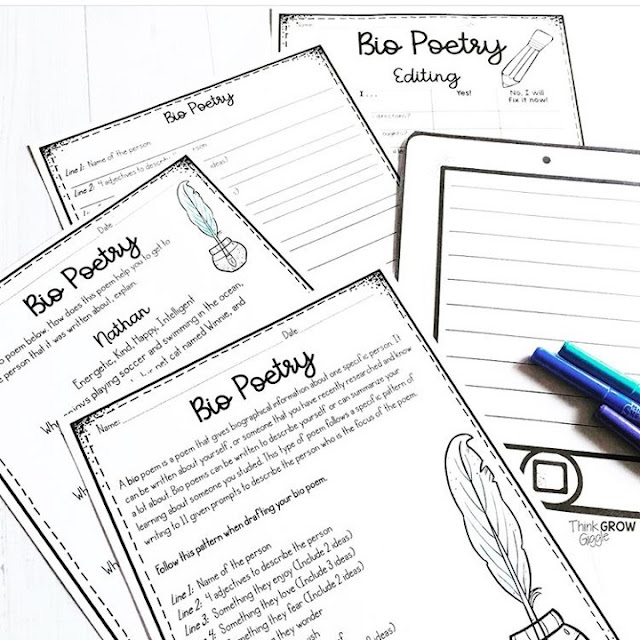 |





